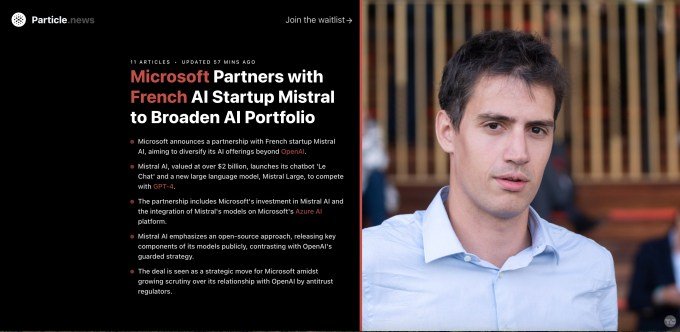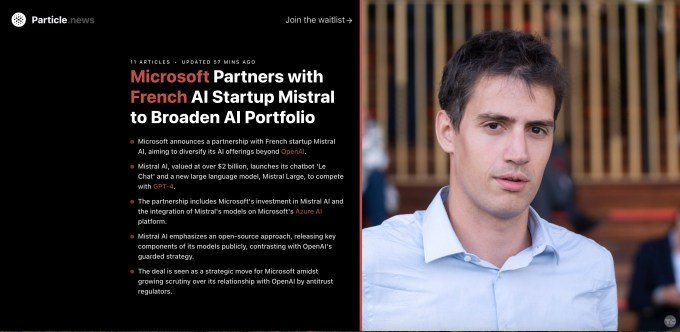
[ad_1]
A team led by former Twitter engineers is rethinking how AI can be used to help people process news and information. Particle.news, which entered into private beta over the weekend, is a new startup offering a personalized, “multi-perspective” news reading experience that not only leverages AI to summarize the news, but aims to do so in a way that fairly compensates authors and publishers — or so is the claim.
While Particle hasn’t yet shared its business model, it arrives at a time when there’s a growing concern about the impact of AI on a rapidly shrinking news ecosystem. News that is summarized by AI could limit clicks to publishers’ websites, which means their ability to monetize via advertising would also be reduced.
The startup was founded last year by former Senior Director of Product Management at Twitter, Sara Beykpour, who worked on products like Twitter Blue, Twitter Video, and conversations, and had spearheaded the experimental app, twttr. She had been at Twitter from 2015 through 2021, growing her position from software engineering to that of a senior director of product management. Her co-founder is a former senior engineer at both Twitter and Tesla, Marcel Molina.
The premise behind Particle, as Beykpour explained last month, is to make it easier to keep up with news using AI.
“Sometimes it feels like headlines are all we have time for. We also want to understand more, but faster,” she wrote in an introduction to the startup on Threads. “We’re in the early stages of using AI to transform the way we interact with news.”
Using Particle, news readers are offered a quick, bulleted summary of the story, with information pulled from a variety of sources. However, when announcing the private beta, Beykpour noted that readers can either use the summary to get up to speed or can choose to go deeper to “learn about how a story has unfolded over time.”
The venture-backed startup has raised funding from Kindred Ventures and Adverb Ventures, as well as various angel investors, including Twitter and Medium co-founder Ev Williams and Behance founder, Scott Belsky.
Remarked Belsky on X, “Particle has become a daily app for me. It synthesizes the many articles (and angles) on any news topic, surfaces the key points as objectively as possible, and lets you dig further across many dimensions. In the era of abstraction ahead, great example of daily AI,” he wrote.
Particle offers a demo of its technology for logged-out users via its website, where articles are featured along with their summary, timestamp as to when they were last updated, and, in a small section at the bottom, the sources they draw from.
These sources pull from across the political spectrum and include big-name publishers like The New York Times, CNBC, the AP, ABC, CNN, Breitbart, The Guardian, The Washington Post, Politico, Fox News, USA Today, The Daily Caller, New York Post, The Hill, and others. International outlets are also pulled from, when relevant, the demos indicate. However, each bullet point is not linked to its original source or sources, which makes it difficult to fact-check the accuracy of the AI summary without delving into all the articles. (Key terms are, however, linked). We noted, too, that the photograph accompanying a news summary is watermarked with the publisher’s logo.

Image Credits: Particle
The end product will likely differ, given that Particle is just now launching its private beta for testing, and intends to offer a mobile app in the future, as it’s hiring for a Senior iOS Engineer.
A similar model of leveraging a variety of news sources and then employing AI to summarize, was recently employed by Artifact, the now-shuttered startup from Instagram’s co-founders. In its case, Artifact’s team curated the news sources up front based on factors related to their integrity and quality. For example, the outlet had to be quick to make corrections, when wrong, and be transparent about their funding. We’re hoping to talk in more detail about how Particle vets its sources closer to a public launch.
Another AI-powered news app, Bulletin, also recently launched to tackle clickbait along with offering news summaries.
Given the interest in this space, what could make Particle stand out is its founding team. Arriving from Twitter, the co-founders have experienced what a real-time news ecosystem feels like, and have the technical and product experience to build a quality product. Whether or not publishers who feel that AI is eating into their space will feel “fairly compensated,” however, remains to be seen.
Adverb Ventures co-founder and Managing Direct April Underwood praised Particle in a post on LinkedIn about the firm’s investment.
“We got the chance to back them just as we were completing our very first close for Fund 1 — we had to wait for our first capital call to hit to wire them the money!,” she said on Sunday, adding that Adverb closed its $75 million Fund I just a couple of months ago. “Sara and Marcel are the kind of founders we dreamed of backing when we set out to build a new early-stage firm. They are going after a big problem space. They’ve got the skills to tackle big problems at a high level of product quality. And they can attract other talented folks to join them, and together invent a future consumers don’t know to ask for (yet),” Underwood wrote.
Requests for comment were not returned. Particle’s beta sign-up form is here.
[ad_2]
Source link







